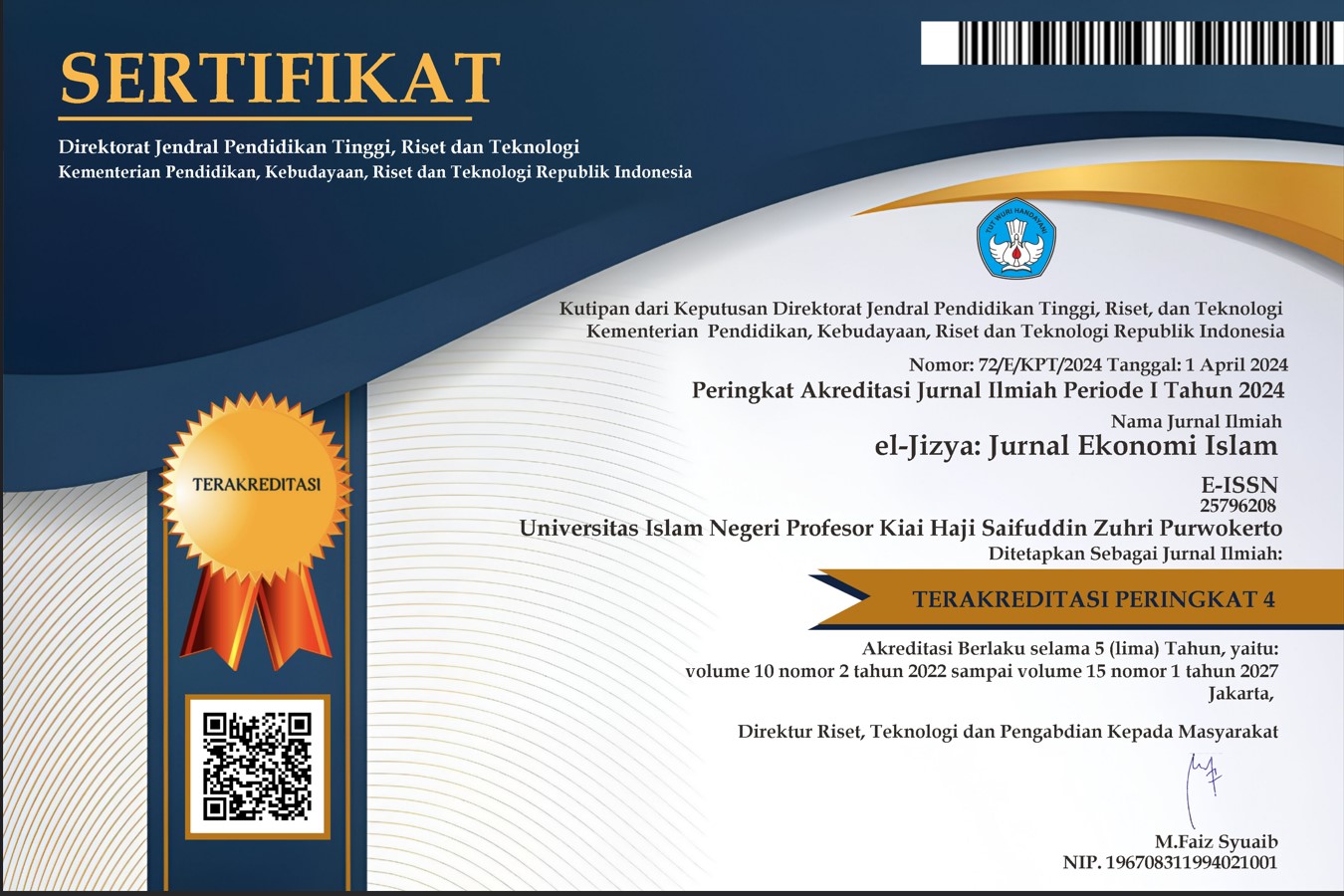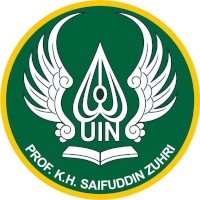POLA INVESTASI TENAGA KERJA WANITA INDONESIA DI DESA SIKANCO KECAMATAN NUSAWUNGU KABUPATEN CILACAP
DOI:
https://doi.org/10.24090/ej.v7i1.3449Keywords:
Female Labor, Savings, Deposits, Stocks Property, Collectibles, , Foreign Currencies And BondsAbstract
Islam teaches that husbands are obliged to provide for their families. But not a few women are just working after they get married to help the family's economy. Family background that is not capable of causing people not to have higher education. Low education makes people work in the informal sector with relatively low salaries. The low salary received is not enough to meet daily needs, especially the needs of clothing and shelter. This shortage triggered the wives to work abroad with high salaries even though they worked in the informal sector. This study aims to describe the investment pattern of Indonesian female workers in Sikanco Village, Nusawungu, Cilacap District. The results of this study concluded that the informants who invest in savings are many but over time their savings are used up to meet their daily needs. The majority of female workers do not invest in deposits, only one person has ever invested in deposits. However, as time went on after returning to Indonesia, the deposit was used up because migrant workers did not have income, so they used the deposit money to sufficient needs. There are no migrant workers who invest in shares. This is because of the ignorance of the migrant workers and their families about investing in shares. The majority of informants invest in property because it is in the investment village because more investment villages are chosen. Investment in collectibles such as motorbikes and cars is quite attractive to informants because it can be used as a means of transportation. The majority of respondents invest in gold, because in addition to investing in gold can be used as jewelry. Many female workers who were respondents in this study kept foreign currency, but it ran out over time. There are no respondents who invest in bonds, because of the unknown knowledge of migrant workers and their families regarding bonds.References
Abdul Aziz. 2010. Manajemen Investasi Syar’iah. Alfabeta. Bandung.
Alsa, A. 2010. Pendekatan Kualitatif dan Kuantitatif Serta Kombinasinya dalam Penelitian Psikologi. Pustaka Pelajar. Yogyakarta.
Goble, Frank. 1987. A. Supratiknya, ed. Mazhab Ketiga, Psikologi Humanistik Abraham Maslow. Kanisius.
Hamidah dan Farida. 2017. Analisis Prioritas Investasi Keluarga Tenaga Kerja Indonesia (TKI) Di Kecamatan Babadan Kabupaten Ponorogo. Jurnal Akuntansi Dewantara Vol. 1 No. 1 April 2017.
Hanafi, Mahmud. 2017. Manajemen Keuangan. BPFE. Yogyakarta.
Hartono, Jogiyanto. 2016. Teori Portofolio dan Analisis Investasi. BPFE. Yogyakarta.
Indah Yuliana. 2010. Investasi Produk Keuangan Syariah. UIN MALIKI PRESS. Malang.
Karlina. 2017. Pengaruh Bekerja Di Luar Negeri Terhadap Tingkat Ekonomi Dan Perceraian. Social Science Education Journal, Vol. 4 No. 1.
Lalu Husni, 2014, Pengantar Hukum Ketenagakerjaan. Rajawali. Jakarta.
Meolong, L. J. 2004. Metodelogi Penelitian Kualitatif. Bandung : PT. Remaja Rosdakarya.
Qur’an Surat Al Baqarah: 233
Qur’an Surat Ath Thalaq ayat 8
Qur’an Surat Ath Thalaq: 7
Raharto. 2017. Pengambilan Keputusan Tenaga Kerja Indonesia (TKI) Perempuan Untuk Bekerja Di Luar Negeri: Kasus Kabupaten Cilacap. Jurnal Kependudukan Indonesia. Vol. 12 No. 1 Juni 2017.
Senduk, S, 2004, Seri Perencana Keuangan Keluarga : Mencari Penghasilan Tambahan, Alex Media Komputoindo, Jakarta.
Sugiono. 2017. Interpretasi Dampak Keuangan Keluarga Tenaga Kerja Wanita (Studi Fenomenologi TKW Pamekasan Yang Berimigrasi Ke Saudi Arabia Dan Malaysia). Seminar Nasional Hasil Penelitian Universitas Kanjuruhan Malang 2017.
Sugiyono. 2010. Metode Penelitian Pendidikan (Pendekatan Kuantitatif, Kualitatif, dan R & D). Bandung: CV. Alfabeta.
Sukirno, Sadono. (2004). Makro Ekonomi. Edisi Ketiga. Jakarta: PT. Raja Grafindo Persada.
Sumarsono,S., (2009), Teori dan Kebijakan Publik Ekonomi Sumber Daya Manusia, Cetakan I, Graha Ilmu, Yogyakarta.
Sunariyah, 2003. Pengantar Pengetahuan Pasar Modal, edisi ke tiga, UPP-AMP YKPN, Yogyakarta.
Todaro, M.P., (2006), Pembangunan Ekonomi, Edisi 9, Penerbit, Pearson. Education Limitied. United Kingdom.
Alsa, A. 2010. Pendekatan Kualitatif dan Kuantitatif Serta Kombinasinya dalam Penelitian Psikologi. Pustaka Pelajar. Yogyakarta.
Goble, Frank. 1987. A. Supratiknya, ed. Mazhab Ketiga, Psikologi Humanistik Abraham Maslow. Kanisius.
Hamidah dan Farida. 2017. Analisis Prioritas Investasi Keluarga Tenaga Kerja Indonesia (TKI) Di Kecamatan Babadan Kabupaten Ponorogo. Jurnal Akuntansi Dewantara Vol. 1 No. 1 April 2017.
Hanafi, Mahmud. 2017. Manajemen Keuangan. BPFE. Yogyakarta.
Hartono, Jogiyanto. 2016. Teori Portofolio dan Analisis Investasi. BPFE. Yogyakarta.
Indah Yuliana. 2010. Investasi Produk Keuangan Syariah. UIN MALIKI PRESS. Malang.
Karlina. 2017. Pengaruh Bekerja Di Luar Negeri Terhadap Tingkat Ekonomi Dan Perceraian. Social Science Education Journal, Vol. 4 No. 1.
Lalu Husni, 2014, Pengantar Hukum Ketenagakerjaan. Rajawali. Jakarta.
Meolong, L. J. 2004. Metodelogi Penelitian Kualitatif. Bandung : PT. Remaja Rosdakarya.
Qur’an Surat Al Baqarah: 233
Qur’an Surat Ath Thalaq ayat 8
Qur’an Surat Ath Thalaq: 7
Raharto. 2017. Pengambilan Keputusan Tenaga Kerja Indonesia (TKI) Perempuan Untuk Bekerja Di Luar Negeri: Kasus Kabupaten Cilacap. Jurnal Kependudukan Indonesia. Vol. 12 No. 1 Juni 2017.
Senduk, S, 2004, Seri Perencana Keuangan Keluarga : Mencari Penghasilan Tambahan, Alex Media Komputoindo, Jakarta.
Sugiono. 2017. Interpretasi Dampak Keuangan Keluarga Tenaga Kerja Wanita (Studi Fenomenologi TKW Pamekasan Yang Berimigrasi Ke Saudi Arabia Dan Malaysia). Seminar Nasional Hasil Penelitian Universitas Kanjuruhan Malang 2017.
Sugiyono. 2010. Metode Penelitian Pendidikan (Pendekatan Kuantitatif, Kualitatif, dan R & D). Bandung: CV. Alfabeta.
Sukirno, Sadono. (2004). Makro Ekonomi. Edisi Ketiga. Jakarta: PT. Raja Grafindo Persada.
Sumarsono,S., (2009), Teori dan Kebijakan Publik Ekonomi Sumber Daya Manusia, Cetakan I, Graha Ilmu, Yogyakarta.
Sunariyah, 2003. Pengantar Pengetahuan Pasar Modal, edisi ke tiga, UPP-AMP YKPN, Yogyakarta.
Todaro, M.P., (2006), Pembangunan Ekonomi, Edisi 9, Penerbit, Pearson. Education Limitied. United Kingdom.
Downloads
Published
26-12-2019
How to Cite
Ma’sumah, S. (2019). POLA INVESTASI TENAGA KERJA WANITA INDONESIA DI DESA SIKANCO KECAMATAN NUSAWUNGU KABUPATEN CILACAP. El-Jizya : Jurnal Ekonomi Islam, 7(1), 103–128. https://doi.org/10.24090/ej.v7i1.3449
Issue
Section
Articles
License
Authors who publish with this journal agree to the following terms:
- Authors retain copyright and grant the journal right of first publication with the work simultaneously licensed under a Creative Commons Attribution-ShareAlike License that allows others to share the work with an acknowledgement of the work's authorship and initial publication in this journal.
- Authors are able to enter into separate, additional contractual arrangements for the non-exclusive distribution of the journal's published version of the work (e.g., post it to an institutional repository or publish it in a book), with an acknowledgement of its initial publication in this journal.
- Authors are permitted and encouraged to post their work online (e.g., in institutional repositories or on their website) prior to and during the submission process, as it can lead to productive exchanges, as well as earlier and greater citation of published work (See The Effect of Open Access).
















